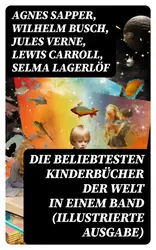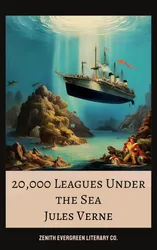Die Sammlung 'Die spannendsten Abenteuerromane aller Zeiten' bietet einen faszinierenden Einblick in die Vielfalt und den Reichtum der Abenteuerliteratur, illustriert durch eine Vielzahl stilistischer Ansätze und literarischer Erzähltraditionen. Diese Anthologie vereint Werke von den Titanen der Abenteuerliteratur wie Jules Verne und Robert Louis Stevenson bis hin zu wegweisenden Wortschöpfern wie Edgar Allan Poe und Rudyard Kipling. Ob durch die wilden Fantasiewelten von Verne und Twain oder die packenden Seefahrtsgeschichten von Melville, jede Geschichte trägt zur facettenreichen Erörterung des Abenteuerbegriffs bei. Die Illustrationen bereichern das Leseerlebnis, indem sie das imaginative Potenzial der Erzählungen visuell untermauern. Hinter jedem Beitrag stehen Autoren, die durch ihre einzigartigen Perspektiven und stilistischen Innovationen den Kanon der Weltliteratur erweitert haben. Diese Sammlung ist nicht nur eine Ehrung der klassischen Abenteurerzählungen des 19. und frühen 20. Jahrhunderts, sondern auch eine Würdigung der Vielfalt der kulturellen und literarischen Einflüsse. Die im Band vereinigten Schriftsteller sind durch gemeinsame Themen wie Entdeckung, Ungewissheit und Mut verbunden, während sie gleichzeitig ihre individuellen Prägungen durch historische, geographische oder soziokulturelle Hintergründe einfliessen lassen. Diese Verbindung erschafft ein Kaleidoskop der Erzählkunst, das gleichermaßen für Literaturwissenschaftler wie für den interessierten Laien aufschlussreich ist. Für Leser bietet diese Anthologie eine wertvolle Gelegenheit, eine breite Palette an literarischen Meisterwerken in einem einzigen Band zu entdecken. Die Vielfalt der vertretenen Stile und Perspektiven regt zum Nachdenken an und fördert einen lebendigen Dialog zwischen den einzelnen Erzählungen. Diese illustrierte Ausgabe lädt dazu ein, sich auf eine fesselnde Reise durch die Welt der Abenteuerromane zu begeben und gleichzeitig das kulturelle Erbe sowie die historische Bedeutung dieser Genrebücher zu würdigen. Ein solches Werk eröffnet nicht nur einen Zugang zu tiefen Einsichten, sondern ermutigt auch zur kritischen Reflexion über das Wesen von Abenteuer und Entdeckung in der Literatur.

20.000 Meilen unter dem Meer - Hörbuch
Jules Verne
audiobook
The Mysterious Island
Jules Verne
audiobookbook
Die beliebtesten Kinderbücher der Welt in einem Band (Illustrierte Ausgabe) : Die Abenteuer Tom Sawyers, Heidi, Nesthäkchen, Peterchens Mondfahrt, Alice im Wunderland…
Agnes Sapper, Wilhelm Busch, Jules Verne, Lewis Carroll, Selma Lagerlöf, Johanna Spyri, Charles Dickens, Heinrich Hoffmann, Mark Twain, Gerdt von Bassewitz, Harriet Beecher Stowe, Robert Louis Stevenson, Julius Wolff, Frances Hodgson Burnett, Rudyard Kipling, Gottfried August Bürger, Carlo Collodi, Hans Christian Andersen, Else Ury, Hermann Bote, Brüder Grimm, Lothar Meggendorfer, E.T.A Hoffman, Elsbeth Montzheimer
book
The Purchase of the North Pole
Jules Verne
book
Around the World in Eighty Days : Jules Verne's Timeless Adventure of Speed, Strategy, and Global Wonders
Jules Verne, Zenith Horizon Publishing
book
Vingt mille lieues sous les mers - Livre Audio
Jules Verne, Livres audio en français
audiobook
Ein Abenteuer in Mexiko
Jules Verne
audiobook
Around the World in Eighty Days : A Timeless Adventure Novel by Jules Verne
Jules Verne, Zenith Golden Quill
book
20,000 Leagues under the Sea : A Deep-Sea Sci-Fi Adventure with Captain Nemo and the Nautilus
Jules Verne, Zenith Evergreen Literary Co
book
Die Meuterer von der Bounty
Jules Verne
audiobookbook
Michel Strogoff - Livre Audio
Jules Verne, Livres audio en français
audiobook
Journey to the Center of the Earth - Audiobook
Jules Verne, Classic Audiobooks
audiobook
